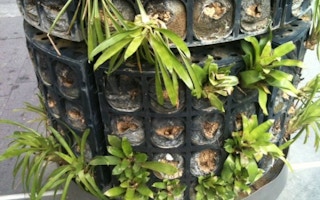A Japanese company has joined forces with the National University of Singapore’s (NUS) School of Design and Environment to conduct research into green walls for the urban landscape.
Suntory Limited, a unit of the Japanese food and beverage firm Suntory Group, signed an agreement on Tuesday to collaborate with the school on research and development (R&D) for vertical growing systems for plants that will grow in urban environments without soil.
Dr Hideo Tsuijimura, managing executive of Suntory, said in a statement that the R&D project will feature the firm’s key technology, a soil-less planting material called Pafcal, designed to maintain the ideal air-water balance over the entire surface of green walls.
Suntory will provide the technology and plants for laboratory research at the school, and will exchange research results and technical information with school researchers. The joint research project will look into the cooling effects of green walls, the water absorption and resource retention of the system, the best plants to use, and the quality of water after passing the green wall.
Green walls and vertical gardens have been gaining in popularity recently, especially in space-constrained urban settings. In Singapore, high profile projects such as the ‘Supertrees’ at Marina Bay’s Gardens by the Bay and the green wall at City Square Mall are used to make green buildings greener and to enhance the city’s garden-like atmosphere. They are also used to reduce the heat island effect, which is the tendency of built environments to retain more heat than natural settings.
But the use of vertical greening systems has not been problem-free. Environmentalists criticised early vertical greening systems for the excessive use of water, energy and chemicals for fertilisation. They can also be difficult to maintain. Many of the plants on one of Singapore’s most visible vertical greening projects - the green pillars installed at the top of Orchard Road - were dead or dying before the columns were recently covered (see photo).
The NUS-Suntory collaboration will include opportunities to share lessons learned and network, both at scientific seminars and forums that promote commercialisation and implementation of new technologies.
“This collaboration also provides an ideal platform for us to gain a foothold in this region and expand our greening business in Southeast Asia,” said Dr Tsujimura.
NUS Professor Heng Chye Kiang, who signed the MOU on behalf of the School of Design and Environment, said the school encourages the use of design and technology to alleviate environmental problems associated with rapid urbanisation and habitat loss.
“This collaborative effort between NUS and Suntory demonstrates our commitment to exploring innovative and viable solutions in the area of vertical greening systems,” he said.










